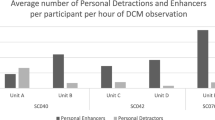Abstract
This study investigates the professional characteristics of care staff working in group homes for the mentally ill in a north London region. Opportunities for training and staff attitudes with respect to training and career prospects are examined. The majority of care staff are unqualified and in many cases the training needs of staff are not being met. Staff viewed their career prospects as limited. Training that is on offer to staff in principle is often not accessed, possibly owing to budget restrictions. The need for more stringent guidelines on staff training to maintain standards across agencies is highlighted.
Similar content being viewed by others
References
Arnott S (1993) The landladies of Fishponds: a study of private community care. Psychiatr Bull 17:713–715
Baxter L (1995) Summary of proceedings of the Tenth Annual Conference of the Team for the Assessment of Psychiatric Services. TAPS Research Unit, London
Faulkner A, Field V, Lindesay J (1993) Residential care provision in mental health: the current picture and future uncertainties. J Ment Health 2:57–64
Hallam A, Beecham J, Knapp M, Fenyo A (1994) The TAPS Project. 23: The costs of accommodation and care. Community provision for former long-stay psychiatric hospital patients. Eur Arch Psychiatry Clin Neurosci 243:301–310
Leff J, Thornicroft G, Coxhead N, Crawford C (1994) The TAPS Project. 22: A five-year follow-up of long-stay patients discharged to the community. Br J Psychiatry 165 [Suppl 25]:13–17
Leff J, Dayson D, Gooch C, Thornicroft G, Wills W (1996) The TAPS Project. 19: Quality of life of long-stay patients discharged from two psychiatric institutions. Psychiatr Serv 47:62–67
Leff J, Trieman N, Gooch C (1996) Team for the Assessment of Psychiatric Services (TAPS) Project 33: prospective follow-up study of long-stay patients discharged from two psychiatric hospitals. Am J Psychiatry 153:1318–1324
Lewis A, Trieman N (1995) The TAPS Project. 29: Residential care provision in north London: a representative sample of ten facilities for mentally ill people. Int J Soc Psychiatry 41:257–267
London Borough of Hackney Inspection and Quality Assurance Service (1993) The Registered Homes Act 1984 Guidance for Registration: a code of practice for people in London who run residential care homes (March 1993 edn) endorsed by London Boroughs' Association and Association of London Authorities. London Borough of Hackney, London
Moore E, Ball RA, Kuipers L (1992) Expressed emotion in staff working with the long-term adult mentally ill. Br J Psychiatry 161:802–808
National Institute for Social Work (1988) Residential care: a positive choice. Report of the independent review of residential care chaired by Gillian Wagner. HMSO, London
Perring C (1992) The experience and perspectives of patients and care staff on the transition from hospital to community-based care. In: Ramon S (ed) Psychiatric hospital closure: myths and realities. Chapman and Hall, London
Peterson PD, Borland A (1995) Use of state hospital staff to provide training for staff of community residential facilities. Psychiatr Serv 46:506–508
Randolph FL, Ridgway MSW, Carling PJ (1991) Residential programs for persons with severe mental illness: a nationwide survey of state-affiliated agencies. Hosp Commun Psychiatry 42: 1111–1115
Report of the inquiry into the circumstances leading to the death of Jonathan Newby (1995) Oxfordshire Health, Headington, Oxford
Tarrier N, Barrowclough C, Porceddu K, Fitzpatrick E (1994) The Salford family intervention project: relapse rates of schizophrenia at five and eight years. Br J Psychiatry 165:829–832
Thornicroft G, Bebbington P (1989) Deinstitutionalisation: from hospital closure to service development. Br J Psychiatry 155: 739–753
Trieman N, Leff J (1996a) The diffucult to place patients in a psychiatric hospital closure programme. The TAPS Project 24. Psychol Med 26:765–774
Vaughn C, Leff J (1976a) The influence of family and social factors on the course of psychiatric illness. Br J Psychiatry 129:125–137
Vaughn C, Leff J (1976b) The measurement of expressed emotion in the families of psychiatric patients. Arch Gen Psychiatry 41: 1169–1177
Vaughn C, Snyder KS, Jones S et al (1984) Family factors in schizophrenic relapse: replication in California of British research on expressed emotion. Br J Soc Clin Psychol 15:157–165
Author information
Authors and Affiliations
Rights and permissions
About this article
Cite this article
Senn, V., Kendal, R. & Trieman, N. The TAPS project 38: level of training and its availability to carers within group homes in a London district. Soc Psychiatry Psychiatr Epidemiol 32, 317–322 (1997). https://doi.org/10.1007/BF00805435
Accepted:
Issue Date:
DOI: https://doi.org/10.1007/BF00805435




